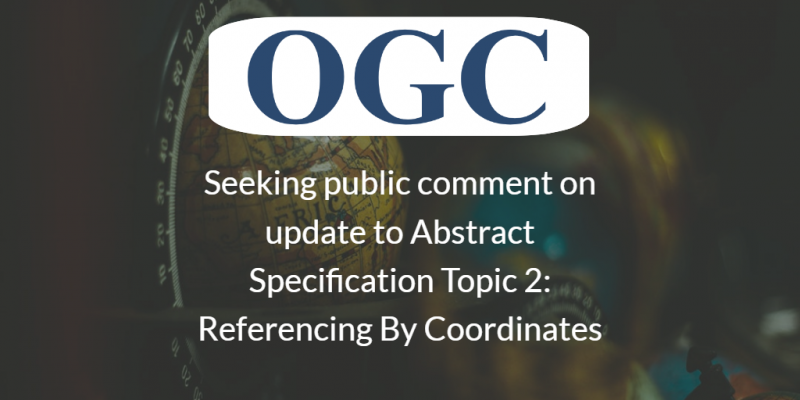Third edition of this Abstract Specification describes the requirements for creating coordinate systems referencing locations in space and time.

The Open Geospatial Consortium (OGC) seeks public comment on the third edition of the Abstract Specification Topic 2: Referencing By Coordinates.
Aligned with the draft third edition (2018) of ISO 19111, Geographic Information – Referencing by coordinates, the Abstract Specification describes the data elements, relationships, and associated metadata required for spatial referencing by coordinates, expanded from a strictly spatial context to include time. The document was prepared by the OGC Coordinate Reference Systems Standards Working Group in close collaboration with ISO Technical Committee ISO/TC 211, Geographic information/Geomatics.
In addition to describing a coordinate reference system, the Abstract Specification provides for the description of a coordinate operation between two different coordinate reference systems, or a coordinate operation to account for crustal motion over time. With such information, spatial data referenced to different coordinate reference systems can be referenced to one specified coordinate reference system at one specified time. This facilitates spatial data integration. Alternatively, an audit trail of coordinate manipulations can be maintained.
This third edition cancels and replaces the second edition (OGC Topic 2 of 2008), which has been technically revised. This document also incorporates the provisions of OGC Topic 2.1 of 2010, which is to be cancelled.
The changes in this edition compared to the previous edition are:
- inclusion of applicable modern geodetic terminology;
- extension to describe dynamic geodetic reference frames;
- extension to describe geoid-based vertical coordinate reference systems;
- extension to allow triaxial ellipsoid for planetary applications;
- extension to describe three-dimensional projected coordinate reference systems;
- addition of 'datum ensembles' to allow grouping of related realizations of a reference frame where for lower accuracy applications the differences are insignificant;
- clarification in the modelling of derived coordinate reference systems;
- remodelling of the metadata elements scope and extent;
- addition of requirements to describe coordinate metadata and the relationship between spatial coordinates.
- additional modelling of temporal coordinate reference system components sufficient for spatio-temporal coordinate referencing;
- consolidation of the provisions of OGC Abstract Specification Topic 2.1 (Spatial referencing by coordinates – Extension for parametric values) into this document;
- change in name from 'Spatial referencing by coordinates' to 'Referencing by coordinates', due to the inclusion of the non-spatial coordinate reference system subtypes of parametric (from Abstract Specification topic 2.1) and temporal.
- the correction of minor errors.
The various OGC Abstract Specifications provide the conceptual foundation for most OGC standards development activities. Open interfaces and protocols are built and referenced against Abstract Specifications, thus enabling interoperability between different brands and different kinds of spatial processing systems. The Abstract Specification provides a reference model for the development of OGC Implementation Standards.
The Abstract Specification Topic 2: Referencing By Coordinates is now available for comment and review by any interested parties. Comments are due by 21 May 2018 and should be submitted via the method outlined at www.opengeospatial.org/standards/requests/166.
About OGC
The Open Geospatial Consortium (OGC) is an international consortium of more than 525 companies, government agencies, research organizations, and universities participating in a consensus process to develop publicly available geospatial standards. OGC standards support interoperable solutions that ‘geo-enable' the Web, wireless and location-based services, and mainstream IT. OGC standards empower technology developers to make geospatial information and services accessible and useful within any application that needs to be geospatially enabled. Visit the OGC website at www.opengeospatial.org.
“
